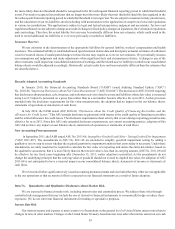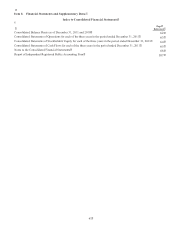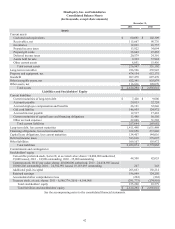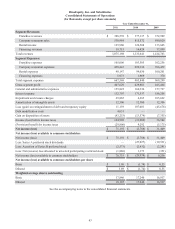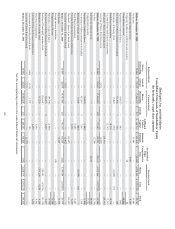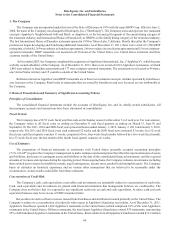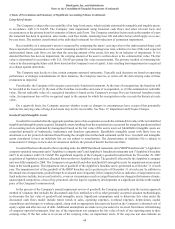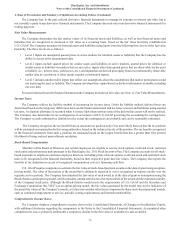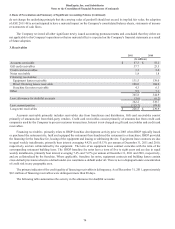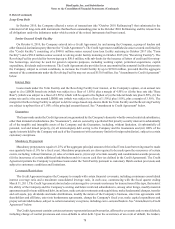IHOP 2011 Annual Report Download - page 87
Download and view the complete annual report
Please find page 87 of the 2011 IHOP annual report below. You can navigate through the pages in the report by either clicking on the pages listed below, or by using the keyword search tool below to find specific information within the annual report.DineEquity, Inc. and Subsidiaries
Notes to the Consolidated Financial Statements (Continued)
2. Basis of Presentation and Summary of Significant Accounting Policies (Continued)
69
impairment, step two must take place. Under step two, the fair value of the assets and liabilities of the reporting unit are estimated
as if the reporting unit were acquired in a business combination. The excess of the fair value of the reporting unit over the amounts
assigned to its assets and liabilities is the implied fair value of the goodwill, to which the carrying value of the goodwill must be
adjusted. The fair value of all reporting units is then compared to the current market value of the Company's common stock to
determine if the fair values estimated in the impairment testing process are reasonable in light of the current market value.
There were no impairments of goodwill or intangible assets recorded in 2011 and 2010. As a result of the impairment reviews
performed in 2009, an impairment of intangible assets was recorded. See Note 17, Impairment and Closure Charges.
Revenue Recognition
The Company's revenues are recorded in four categories: franchise operations, company restaurant operations, rental
operations and financing operations.
The franchise operations revenue consists primarily of royalty revenues, sales of proprietary IHOP products, IHOP advertising
fees and the portion of the franchise fees allocated to the Company's intellectual property. Company restaurant sales are retail sales
at company-operated restaurants. Rental operations revenue includes revenue from operating leases and interest income from direct
financing leases. Financing operations revenue consists of interest income from the financing of franchise fees and equipment
leases, as well as sales of equipment associated with refranchised IHOP restaurants and a portion of franchise fees for restaurants
taken back from franchisees not allocated to IHOP intellectual property.
Revenues from franchised and area licensed restaurants include royalties, continuing rent and service fees and initial franchise
fees. Royalties are recognized in the period in which the sales are reported to have occurred. Continuing fees are recognized in
the period earned. Initial franchise fees are recognized upon the opening of a restaurant, which is when the Company has performed
substantially all initial services required by the franchise agreement. Fees from development agreements are deferred and recorded
into income when a restaurant under the development agreement is opened.
Sales by company-operated restaurants are recognized when food and beverage items are sold. Company restaurant sales
are reported net of sales taxes collected from guests and the sales taxes are remitted to the appropriate taxing authorities.
The Company records a liability in the period in which a gift card is sold. As gift cards are redeemed, this liability is reduced
and revenue is recognized. The Company recognizes gift card breakage income on gift cards issued by Applebee's when the
assessment of the likelihood of redemption of the gift card becomes remote. This assessment is based upon Applebee's historical
experience with gift card redemptions. The Company does not record breakage income on gift cards issued by IHOP because the
IHOP gift card program has not been in existence as long as the Applebee's program and does not have adequate history on which
to base recognition of breakage income.
Allowance for Credit Losses
The allowance for doubtful accounts is the Company's best estimate of the amount of probable credit losses in existing
receivables; however, changes in circumstances relating to receivables may result in additional allowances in the future. The
Company determines the allowance based on historical experience, current payment patterns, future obligations and the Company's
assessment of the ability to pay outstanding balances. The primary indicator of credit quality is delinquency, which is considered
to be a receivable balance greater than 90 days past due. The Company continually reviews the allowance for doubtful accounts.
Past due balances and future obligations are reviewed individually for collectability. Account balances are charged against the
allowance after all collection efforts have been exhausted and the potential for recovery is considered remote.
Leases
The Company leases the majority of all IHOP restaurants. The restaurants are subleased to IHOP franchisees or, in a few
instances, are operated by the Company. The Company's IHOP leases generally provide for an initial term of 15 to 25 years, with
most having one or more five-year renewal options at the Company's option. In addition, the Company leases a majority of its
Applebee's company-operated restaurants. Franchisees are responsible for financing their properties. The Applebee's company-
operated leases generally have an initial term of 10 to 20 years, with renewal terms of five to 20 years, and provide for a fixed
rental plus, in certain instances, percentage rentals based on gross sales. The rental payments or receipts on leases that meet the
operating lease criteria are recorded as rental expense or rental income. Rental expense and rental income for these operating leases
are recognized on the straight-line basis over the original terms of the leases. The difference between straight-line rent expense or
income and actual amounts paid or received represents deferred rent and is included in the balance sheets as other assets or other
liabilities, respectively.


